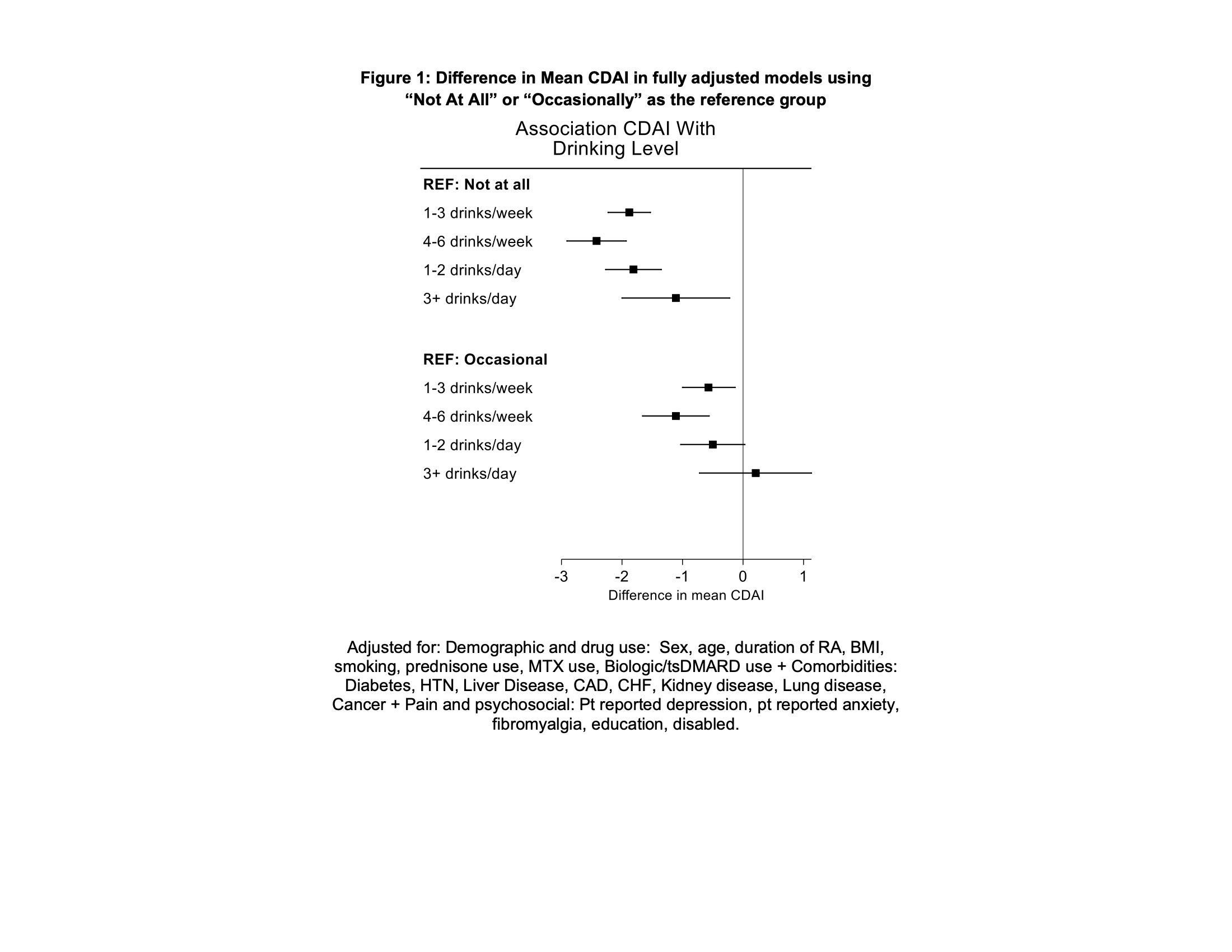Session Information
Date: Monday, October 27, 2025
Title: (1306–1346) Rheumatoid Arthritis – Diagnosis, Manifestations, and Outcomes Poster II
Session Type: Poster Session B
Session Time: 10:30AM-12:30PM
Background/Purpose: The relationship between alcohol use and disease activity among patients with rheumatoid arthritis (RA) remains controversial. Several studies have concluded that moderate drinking may be beneficial for individuals with RA. However, recent concerns about residual confounding have arisen within studies aimed at understanding causal risks of alcohol. This is because non-drinkers may have stopped consuming alcohol because of adverse health. Recent efforts in epidemiologic studies to define occasional use of alcohol as the reference may help reduce this bias. This study aimed to explore associations between alcohol use and clinical disease activity index (CDAI) among RA patients in a large sample, comparing the estimates of association when using non-drinkers or, alternatively, occasional drinkers as the comparison group.
Methods: This cross-sectional study assessed the association between disease activity and frequency of alcohol use, using data from the CorEvitas Rheumatoid Arthritis Registry, a prospective, observational, multi-site study of adults with RA. All patients in the Registry were provided-diagnosed. One visit per patient was randomly chosen, excluding the enrollment visit or last visit. Drinking is patient reported and divided into 6 categories. The association of mean CDAI with drinking categories was estimated using linear regression. A series of nested models adjusted for demographics and drug use, +comorbidities, and +pain and psychosocial factors. Estimates used “Not at All” or “Occasionally” as the reference category in the models.
Results: A total of 30,995 adults with non-missing confounding variables were included in this study. Non-drinkers had higher rates of disability, comorbidities (including diabetes, CAD, CHF, hypertension, obesity, and fibromyalgia), opioid use, depression, and anxiety; as well as higher scores for physician and patient global assessments, tender and swollen joints, pain, and fatigue compared to other categories (Table 1). Compared to non-drinkers, any amount of drinking was associated with a lower CDAI with the greatest apparent benefit observed for moderate drinkers. [Unadjusted β: -3.65 (95 % CI: -4.16, -3.14)]. This was somewhat attenuated with adjustment for confounders [Fully adjusted β: -2.42 (95% CI: -2.91, -1.93)] (Table 2). The unadjusted estimate for moderate drinkers was reduced substantially when using occasional drinkers as the reference group. [Unadjusted β: -1.85 (95% CI -2.43, -1.17)] and was further attenuated with adjustment [β: -1.11 (95% CI: -1.66, -0.56)]. Figure 1 shows the mean difference in CDAI for the fully adjusted models.
Conclusion: Light to moderate alcohol use was associated with lower disease activity in patients with RA, with moderate users seeing the biggest reduction in CDAI. However, the amount of observed benefit was far less when comparing moderate use to occasional use and after adjustment for confounding factors. These data raise questions regarding the accuracy of the estimated benefit of alcohol from prior studies where non-drinkers were used as the reference group and suggests that residual confounding is likely. A biologic mechanism for a benefit of alcohol effect is not known.
 Table 1: Baseline characteristics by alcohol use frequency
Table 1: Baseline characteristics by alcohol use frequency
.jpg) Table 2: Estimated CDAI by drinking category using tiered models
Table 2: Estimated CDAI by drinking category using tiered models
.jpg) Difference in Mean CDAI in fully adjusted models using “Not At All” or “Occasionally” as the reference group
Difference in Mean CDAI in fully adjusted models using “Not At All” or “Occasionally” as the reference group
To cite this abstract in AMA style:
Crisci S, Baker J, Kane K, Reed G, Pappas D, Kremer J. Does Moderate Alcohol Use Lower Disease Activity Among Patients with Rheumatoid Arthritis? [abstract]. Arthritis Rheumatol. 2025; 77 (suppl 9). https://acrabstracts.org/abstract/does-moderate-alcohol-use-lower-disease-activity-among-patients-with-rheumatoid-arthritis/. Accessed .« Back to ACR Convergence 2025
ACR Meeting Abstracts - https://acrabstracts.org/abstract/does-moderate-alcohol-use-lower-disease-activity-among-patients-with-rheumatoid-arthritis/
